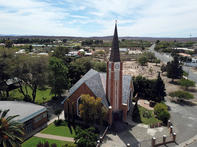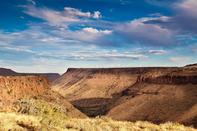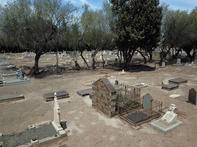Oldest Town in Central Karoo
Beaufort West, the oldest town in the Central Karoo, was founded in 1818 on the farm of Hooivlakte, which translates to ‘hay flats’ in the Karoo. The town was originally called Beaufort by Lord Charles Somerset, who named it after his father, the fifth Duke of Beaufort.

The addition of West to the name happened later to distinguish the town from Port Beaufort.
Beaufort West lays in what became the world's richest collecting grounds for incredible fossils, scientists now describe it as one of the great wonders of the world.
Climate of the Karoo

This arid plateau is the largest of its kind outside of Asia - life here can be harsh, yet people have lived in this South African area for 500 000 years - the Khoi and San people called this area Karusa, the Khoi word for dry, barren, thirstland. Water is still scarce but life springs eternal in a myriad of ways, the Succulent Karoo is a perfect example of Nature's brilliance.
The endless plains and blue mountains once sheltered runaway slaves, smugglers and the banished, akin to the Wild West. Travellers now find serenity here and the incredible clarity of the night skies and country air invigorating this town in the Western Cape. Beaufort West is a place of extreme weather from icy winters to scorching summers.
Remnants of the Past

Step back into local history for an educational transportive experience when you find yourself in beautiful Beaufort West and behold multiple rock engravings of the Khoi and San people. These remnants of the past are accompanied by fossils and stone-age sites that are especially attractive places that are a must-see for visitors with archaeological interests.
The land of Beaufort West holds a rich heritage with multiple stories of the past from the first reptilian fossil discovered in its vicinity to the multitude of architectural sites peppered throughout the town. Beaufort West is filled with historic displays that reveal an interesting colourful past. The Beaufort West town hall is a national monument and there are several Victorian-style turn of the century houses.
Beaufort West is also famous for its pioneers. Born here in the 1800s was Dr Emil, proclaimed as the father of modern orthopaedics, also Albert Fick, who did much of the pioneering work on contact lenses and renowned world heart transplant pioneer, Professor Chris Barnard.
 The geological history of the Karoo is remarkable, despite it being such an arid region. It may be difficult to picture, the Karoo was once ...
The geological history of the Karoo is remarkable, despite it being such an arid region. It may be difficult to picture, the Karoo was once ...